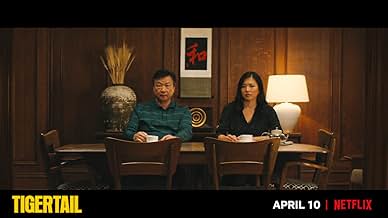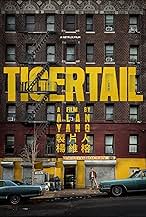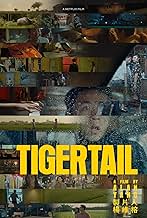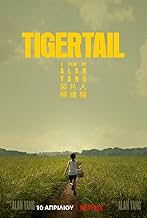In this multigenerational drama, a Taiwanese factory worker leaves his homeland to seek opportunity in America, where he struggles to find connection while balancing family and new-found res... Read allIn this multigenerational drama, a Taiwanese factory worker leaves his homeland to seek opportunity in America, where he struggles to find connection while balancing family and new-found responsibilities.In this multigenerational drama, a Taiwanese factory worker leaves his homeland to seek opportunity in America, where he struggles to find connection while balancing family and new-found responsibilities.
- Director
- Writer
- Stars
- Awards
- 2 wins & 1 nomination total
Queenie Yu-Hsin Fang
- Young Yuan
- (as Yo-Hsing Fang)
Kuei-Mei Yang
- Minghua
- (as Yang Kuei-Mei)
Lynn Masako Cheng
- Child Angela
- (as Lynn Cheng)
Che-Hao Chang
- Kuomintang Soldier #1
- (as Che Hao Chang)
- Director
- Writer
- All cast & crew
- Production, box office & more at IMDbPro
Featured reviews
A movie about people from Taiwan who came to US after they are in their twenties, however, the cast was picked of actors mostly from mainland China and USA.
Watching them speaking mandarin as Taiwanese with strong mainland accent; or speaking perfect native English as an aged Taiwanese is just unreal.
The director should simply hire Taiwanese cast to shoot the film.
I have beared witness to my Taiwanese family and friends who also left Taiwan in the late 60's and early 70's. The emotional and financial sacrifice to forge a possibly(but not guaranteed) better future for your family in a land of a different tongue and color is tremendous. It takes a special breed of person to take upon this burden. Certainly not the type of entitled brats who so easily criticize the accents of the actors. To me, the spoken Taiwanese, the rice fields, the Taiwanese house courtyards, the nightmarkets, the obligatory piano playing are all a jumbulaya of nostalgia for me. This story rings true to me. Sorry for the rant. I'm hungry now, Wa be ki ja bung.
In director Alan Yang's Emmy winning speech for Master of None in 2016, he said that despite there being 17 million Asian-Americans in this country, there was still a lack of representation in television and film. Tigertail is undoubtedly a step towards that direction.
Set over four different time periods across both Taiwan and New York, Tigertail is an immigrant story at heart. When Pin-Jui (played by Tzi Ma) is still a teenager, he reluctantly enters into an arranged marriage as a means to provide money for his ailing mother. He leaves behind his girlfriend and emigrates to New York. After a few years, Pin-Jui and his wife have a daughter of their own, of whom Pin-Jui has a fractured relationship.
From one angle, this immigrant story is formulaic. Parents, with nothing in common, struggle in a foreign land for the sake of their children. But from another angle, Yang shows us nuances and subtleties that demand a deeper inspection. The miniature piano that Pin-Jui scavenges for his wife but remains unplayed over the years. Pin-Jui repeatedly opening and closing the metal gate to his small grocery store through the seasons, showing the passage of time. Pin-Jui's daughter crying in the backseat after being scolded after a piano recital gone wrong.
One nuance that reverberates throughout the film is language. The film features three different languages: English, Mandarin Chinese, and Taiwanese Hokkien. Each language represents a different generation: Pin-Jui's mother exclusively speaks Taiwanese, Pin-Jui primarily speaks Chinese, and Pin-Jui's daughter speaks English. For the entire film, all of the dialogue between Pin-Jui and his daughter is in English. It's not until her father brings her to where he grew up and finally tells her the story of his upbringing: How he gave up his life for another. It's only here, in the final moments of the film where she speaks Chinese for the first time and asks, "What was her name?"
Covering four different time periods in the span of a mere ninety minutes was an ambitious task, and for that reason, the movie feels particularly rushed. Perhaps more attention could have been placed on capturing the relationship between the father and daughter: This has always been a core piece of what it means to be a child of immigrants. Furthermore, the stitching of scenes across different time periods don't always translate well to Pin-Jui's character development as an adult. It's only until the final fifteen minutes of the film do you see this unfold.
Overall, Yang is able to capture the right emotions in his directorial debut and tells a classic story in his own way. The subtleties, reflecting both an Asian-American heritage and relatable familial scenes establish a fulfilling level of depth to the film. True to his own words, you can't help but wonder what Yang will do next.
Set over four different time periods across both Taiwan and New York, Tigertail is an immigrant story at heart. When Pin-Jui (played by Tzi Ma) is still a teenager, he reluctantly enters into an arranged marriage as a means to provide money for his ailing mother. He leaves behind his girlfriend and emigrates to New York. After a few years, Pin-Jui and his wife have a daughter of their own, of whom Pin-Jui has a fractured relationship.
From one angle, this immigrant story is formulaic. Parents, with nothing in common, struggle in a foreign land for the sake of their children. But from another angle, Yang shows us nuances and subtleties that demand a deeper inspection. The miniature piano that Pin-Jui scavenges for his wife but remains unplayed over the years. Pin-Jui repeatedly opening and closing the metal gate to his small grocery store through the seasons, showing the passage of time. Pin-Jui's daughter crying in the backseat after being scolded after a piano recital gone wrong.
One nuance that reverberates throughout the film is language. The film features three different languages: English, Mandarin Chinese, and Taiwanese Hokkien. Each language represents a different generation: Pin-Jui's mother exclusively speaks Taiwanese, Pin-Jui primarily speaks Chinese, and Pin-Jui's daughter speaks English. For the entire film, all of the dialogue between Pin-Jui and his daughter is in English. It's not until her father brings her to where he grew up and finally tells her the story of his upbringing: How he gave up his life for another. It's only here, in the final moments of the film where she speaks Chinese for the first time and asks, "What was her name?"
Covering four different time periods in the span of a mere ninety minutes was an ambitious task, and for that reason, the movie feels particularly rushed. Perhaps more attention could have been placed on capturing the relationship between the father and daughter: This has always been a core piece of what it means to be a child of immigrants. Furthermore, the stitching of scenes across different time periods don't always translate well to Pin-Jui's character development as an adult. It's only until the final fifteen minutes of the film do you see this unfold.
Overall, Yang is able to capture the right emotions in his directorial debut and tells a classic story in his own way. The subtleties, reflecting both an Asian-American heritage and relatable familial scenes establish a fulfilling level of depth to the film. True to his own words, you can't help but wonder what Yang will do next.
That closing shot.
As a story about someone letting it all kinda get away from them (themselves, their desires, their ability to connect emotionally) not due to some significant event but just through their everyday decisions and the passage of time, it's pretty depressing. But also funny and beautiful at times.
It made me real sad despite having no connection to the material or the immigrant experience.
As a story about someone letting it all kinda get away from them (themselves, their desires, their ability to connect emotionally) not due to some significant event but just through their everyday decisions and the passage of time, it's pretty depressing. But also funny and beautiful at times.
It made me real sad despite having no connection to the material or the immigrant experience.
I watched this on Netflix, and the premise was very interesting. A man leaves the love of his love in Taiwan for the chance of immigrating to America with his boss's daughter, and he decides to seek the love he left behind as an old man as well as get along with his estranged daughter.
Though the narrative was interesting, well, I felt that the film could've done more with the characters, esp. Yuan, who is played by veteran actress Joan Chen. I think she should've had more screen time given her acting prowess, and perhaps this could've been a limited series. Maybe I'm insisting on what the movie should've been instead of accepting what it was, but by the time it ended, I was sorta left hanging.
Still, this type of tale should be told more often. As the parents of Asian immigrants myself, it struck a chord with me.
Though the narrative was interesting, well, I felt that the film could've done more with the characters, esp. Yuan, who is played by veteran actress Joan Chen. I think she should've had more screen time given her acting prowess, and perhaps this could've been a limited series. Maybe I'm insisting on what the movie should've been instead of accepting what it was, but by the time it ended, I was sorta left hanging.
Still, this type of tale should be told more often. As the parents of Asian immigrants myself, it struck a chord with me.
The 'Tigertail' Cast Name Their Asian Cinema Picks
The 'Tigertail' Cast Name Their Asian Cinema Picks
Tigertail writer/director Alan Yang is joined by stars Tzi Ma and Christine Ko to name some of their favorite films for you to check out in Asian Cinema.
Did you know
- TriviaAll of the flashback scenes were shot on 16mm film while all the present day scenes were shot on digital.
- How long is Tigertail?Powered by Alexa
Details
- Release date
- Country of origin
- Official site
- Languages
- Also known as
- Hổ Vĩ
- Production companies
- See more company credits at IMDbPro
- Runtime
- 1h 31m(91 min)
- Color
- Aspect ratio
- 2.39 : 1
Contribute to this page
Suggest an edit or add missing content






































